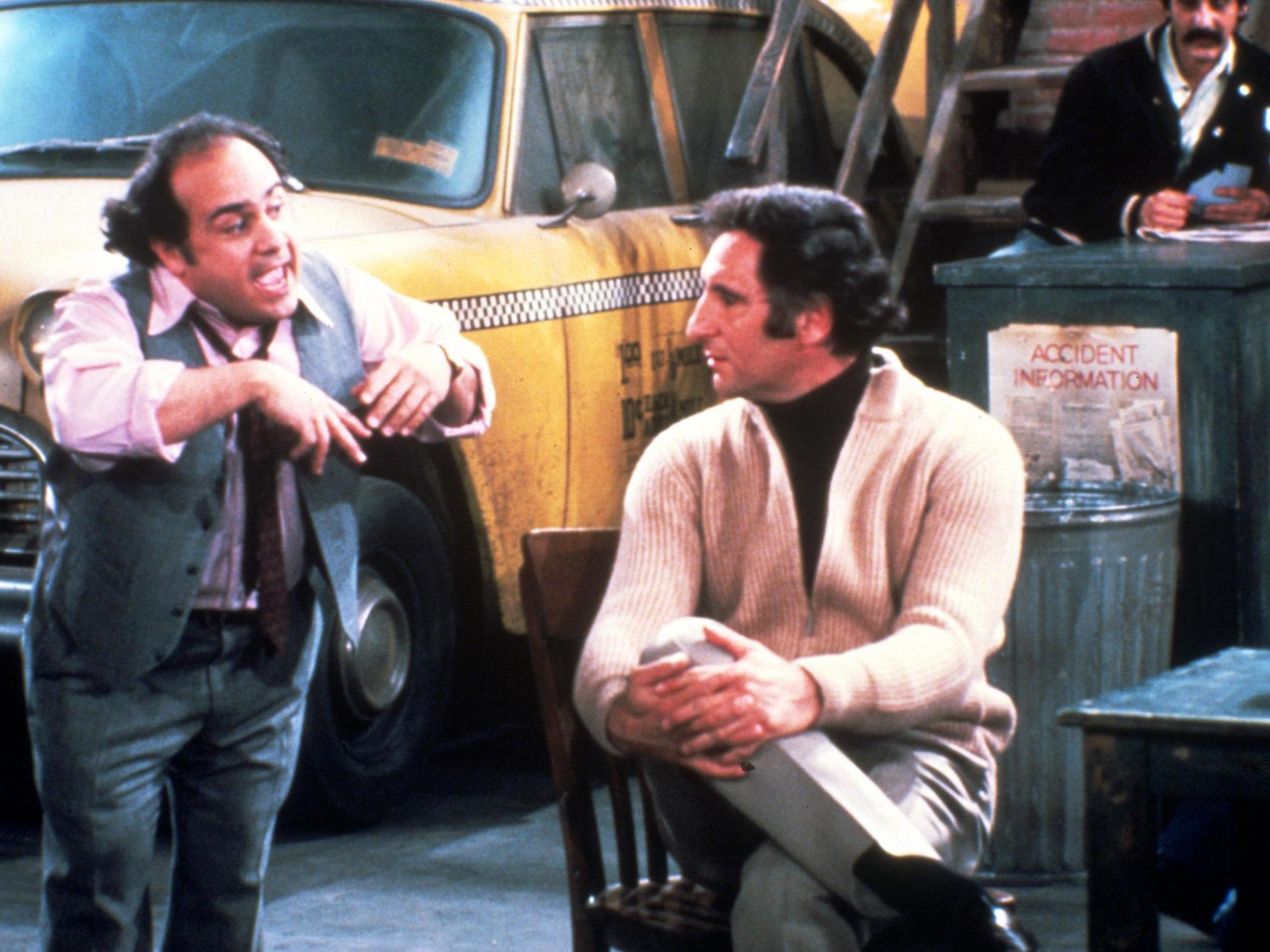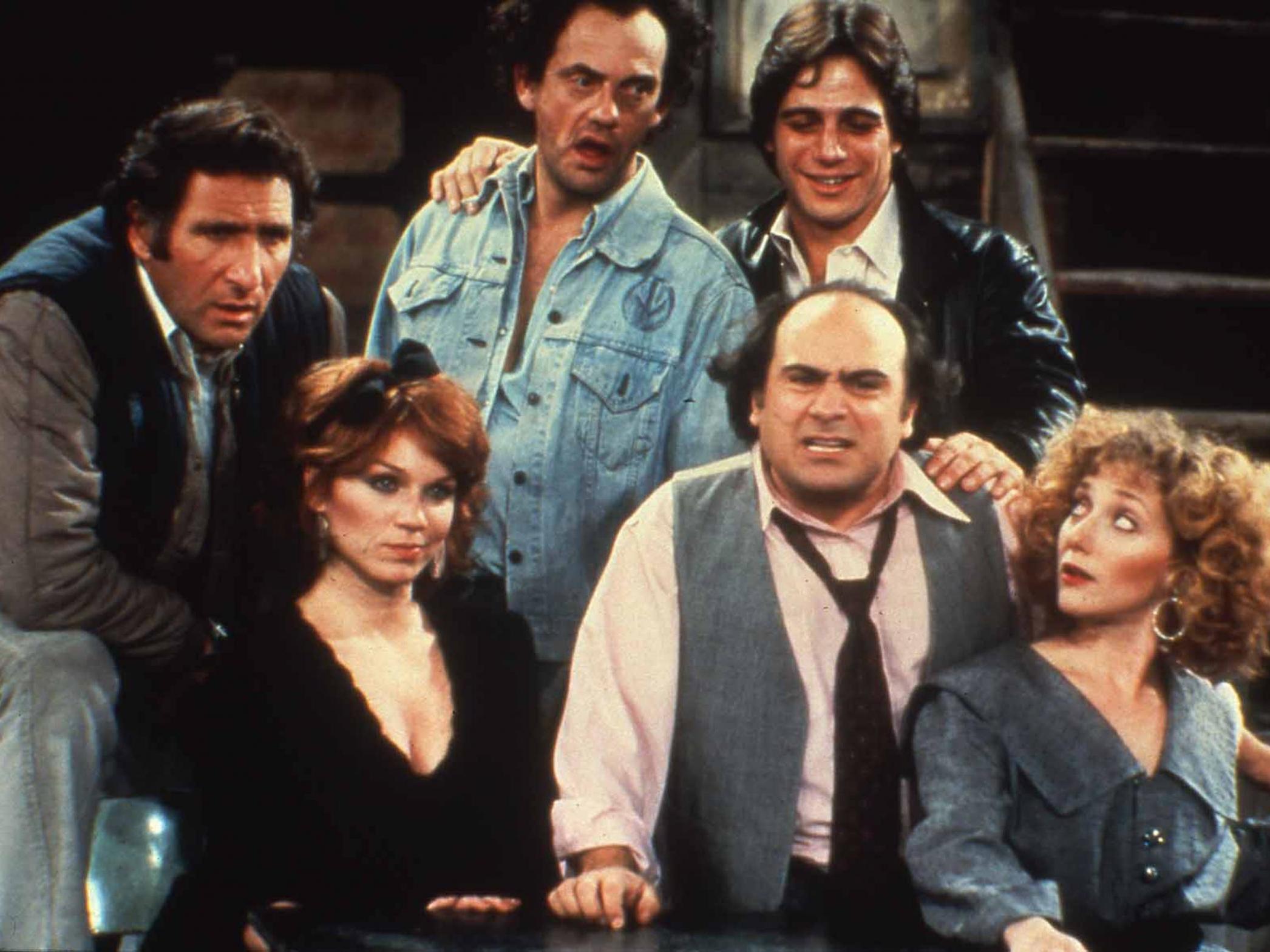Taxi at 40: The blue-collar sitcom that launched careers of Danny DeVito, Andy Kaufman and many others
Classic comedy about New York cabbies dreaming of better things influenced classics that followed, from ‘Cheers’ to ‘Seinfeld’

Your support helps us to tell the story
From reproductive rights to climate change to Big Tech, The Independent is on the ground when the story is developing. Whether it's investigating the financials of Elon Musk's pro-Trump PAC or producing our latest documentary, 'The A Word', which shines a light on the American women fighting for reproductive rights, we know how important it is to parse out the facts from the messaging.
At such a critical moment in US history, we need reporters on the ground. Your donation allows us to keep sending journalists to speak to both sides of the story.
The Independent is trusted by Americans across the entire political spectrum. And unlike many other quality news outlets, we choose not to lock Americans out of our reporting and analysis with paywalls. We believe quality journalism should be available to everyone, paid for by those who can afford it.
Your support makes all the difference.Taxi, the ground-breaking US sitcom that launched the careers of some of America’s finest character actors, celebrates its 40th anniversary this week.
Appearing just two years after Martin Scorsese’s seminal Taxi Driver, the show took a much lighter look at the New York City cab business but placed its emphasis on the same hangdog camaraderie that film portrayed in its central diner scene, where Peter Boyle’s Wizard holds court over a late night cup of coffee and Travis Bickle (Robert DeNiro) is advised to buy a handgun.
Charles Bukowski wrote about training to be a cabbie in Factotum (1975) and there’s plenty of his nicotine-flecked humour in there too, although the show was actually inspired by a New York magazine article by Mark Jacobson, “Night-Shifting for the Hip Fleet”, about life at Greenwich Village’s Dover Taxi Garage #2.
Taxi was masterminded by future Simpsons producer James L Brooks along with Ed Weinberger, Stan Daniels and Dave Davis, all seasoned veterans of The Mary Tyler Moore Show (1970-77).
It was first broadcast on ABC on 12 September 1978, running to 114 episodes over the course of five seasons before wrapping in May 1982, having won 18 Emmys.
The show centred on Danny DeVito’s tyrannical dispatcher Louie De Palma and the crew of misfits who drive for him, all of whom insist the work is nothing more than a short-term means to an end and that any minute now they’ll get their big break and escape.
The rest of its enviable cast included Judd Hirsch, Jeff Conaway, Merilu Henner, Tony Danza, Christopher Lloyd, Carol Kane and, perhaps most extraordinary of all, the performance comic Andy Kaufman – best known for challenging women to wrestling bouts and his lounge lizard alter-ego Tony Clifton – as Eastern European mechanic Latka Gravas.
Jim Carrey played Kaufman in Milos Forman’s biopic Man on the Moon (1999) – opposite DeVito – and recently recounted his descent into Method madness on the set in the Netflix documentary Jim and Andy: The Great Beyond.
As Latka, Kaufman was so much more than a reprisal of his gibberish-spouting “Foreign Man” character from Saturday Night Live and The Tonight Show, the comic bringing an anarchic presence to the set that stopped Taxi conforming to the expected beats of canned-laughter studio comedy, even if his fellow cast members were occasionally left exasperated by his behaviour.

Watch Apple TV+ free for 7 days
New subscribers only. £8.99/mo. after free trial. Plan auto-renews until cancelled

Watch Apple TV+ free for 7 days
New subscribers only. £8.99/mo. after free trial. Plan auto-renews until cancelled

Kaufman could also be poignant, as in the episode “Paper Marriage”, in which Latka marries a prostitute to secure his green card, only for his bride to then walk away from the alter as soon as the ceremony is concluded. “Boy, America is a tough town...” he says forlornly, looking at the floor.
Hirsch, a stage actor perhaps still best known to younger audiences for his role as Jeff Goldblum’s father in Independence Day (1996), was more commonly the heart of the piece, his dishevelled brand of decency, innate reasonableness and air of disappointment providing an emotional counterweight to his co-stars’ antics.
Christopher Lloyd – like Hirsch, defined by a subsequent supporting role in a blockbuster science fiction franchise – did underrated work as the Reverend Jim Ignatowski, a counter-culture casualty driven round the bend by a tainted brownie.
The actor was brought in by DeVito after the pair had appeared as inmates together in Forman’s One Flew Over the Cuckoo’s Nest (1975). While he will always be Back to the Future’s Doc Brown, his sensational performance here is worth revisiting.

DeVito, meanwhile, always had a flair for playing the shyster and, like Kane, is still at it in 2018, bringing his uniquely cantankerous style to FX’s long-running It’s Always Sunny in Philadelphia.
Asked by What’s on TV in 2013 whether he would ever be interested in reprising a role he won by storming into the audition and berating the writers, he replied: “I hate to tell you, but I’ve been playing Louie ever since I started the show!”
Factor in Henner, Danza and Conaway – all vital components in their own right – and rarely has a more naturally gifted ensemble been assembled. More than that, the cast looked like ordinary people, with wild hair and battered denim. You believed they worked for the Sunshine Cab Company.
They got on famously behind-the-scenes too, the show notorious for its boozy episode wrap parties, often honoured with a guest appearance by the likes of John Belushi, Robin Williams and Jack Nicholson, the latter changing his tune after initially advising DeVito against taking his role.
“I’m so proud of Taxi, the way it tackled difficult subjects and yet still made people laugh,” DeVito recalled.
Those subjects included everything from drugs, divorce, single parenting, gambling addiction and obesity. Nothing was off limits.
Crucial to the show’s appeal as a workplace comedy was its setting in Sunshine’s dingy Manhattan depot, which added enormously to Taxi’s blue-collar authenticity.
Emerging from the same hustling New York spirit that spawned Donald Trump – the president’s estranged lawyer Michael Cohen made his money in the cab business – Taxi is as tied to the Big Apple as Cheers was to Boston (actress Rhea Perlman, married to DeVito, appeared in both).
The latter show might not exist without the former, nor might Seinfeld, with which Taxi shared a preoccupation with the petty frustrations of everyday life.
Join our commenting forum
Join thought-provoking conversations, follow other Independent readers and see their replies
Comments